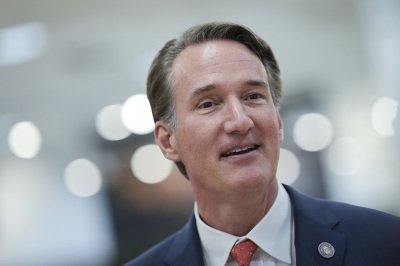Glenn Youngkin sabotages his GOP future with same-sex marriage support

If Virginia Governor Glenn Youngkin (R) had his eyes on higher office, his decision Friday almost certainly put those dreams out of reach.
To the shock of voters across the Commonwealth, Youngkin, who campaigned as a born-again Christian and spent many a Sunday in sanctuaries like Cornerstone Chapel’s, committed the ultimate betrayal — signing a same-sex marriage bill that was not only completely unnecessary but a stinging rebuke of conservative values.
The move, announced in a Friday afternoon news dump to avoid attention, was called “symbolic” by even LGBT activists since the Supreme Court’s Obergefell ruling and Congress’s Respect for Marriage Act already grant the “rights” supposedly reaffirmed here. Youngkin’s decision was even more astounding considering that he’d already panned the need for such legislation two years ago. “In Virginia, we actually do protect marriage,” he told “Face the Nation” viewers in 2022. “That’s the law in Virginia, and therefore, as governor of Virginia, we protect same-sex marriage.”
People had no reason to suspect that the governor’s opinions had changed, since as recently as last Wednesday, Youngkin hadn’t taken a public position on the proposal. And yet, in what local reporters are calling a “surprising twist,” the homegrown governor inked his name to the law, which essentially says that marriage licenses must be given to any two people “seeking a ‘lawful marriage’ regardless of gender, race or sex and that Virginia will recognize such marriages as valid.”
His office pathetically tried to explain away the move as a defense of religious freedom. “The bill adds First Amendment protections to the code of Virginia,” Youngkin spokesman Christian Martinez claimed — apparently forgetting that the First Amendment already applies to the state. Not to mention that one of its most famous residents, Thomas Jefferson, actually drafted the basis for that constitutional framework with his groundbreaking Virginia Statute for Religious Freedom — a point of state pride that Youngkin has willingly undermined.
While the governor’s staff cheered the bill’s conscience rights for pastors, it offers no such shield for bakers, photographers, teachers, web designers, adoption agencies, Christian schools, and so many others. A few throwaway sentences clarifying that ministers won’t be forced to perform actual wedding ceremonies do nothing to resolve the hammer this legislation takes to everyday people. It doesn’t protect the worker who doesn’t want to be forced to celebrate LGBT Pride. It’s not going to help the parent who says, “I don’t want my children indoctrinated with this radical curriculum.” Thanks to Governor Younkin, anyone who believes in marriage as human history defines it is a sitting duck — a prime target for persecution, marginalization, and even civil action.
The most outrageous part of it all is that Youngkin had no reason to consider this proposal in the first place. He threw away his conservative credentials for what is ultimately a Democratic messaging bill. As most legal experts have already explained, the Virginia Constitution supersedes state laws like this one, and it — ironically — defines marriage as voters did in their 2006 amendment: as the union of a man and woman. This law doesn’t change that. It’s moot the second a Supreme Court decides to overturn Obergefell, which would reset every state to its constitution.
The reality is, “same-sex marriage is functionally happening in Virginia,” Family Foundation President Victoria Cobb pointed out on “Washington Watch” Monday, “not by the will of the people, but by a court decision.” “But this is really a bill that was [the Democrats’] effort to codify same-sex marriage, to get it into our code so that it is written down somewhere.” As for the so-called religious liberty components, they’re a “fig leaf,” she insisted. It excludes a whole host of everyday people who aren’t working in a church or clerk’s office.
Worse, she adds, this law suggests that “sex and gender are different,” the fallout of which could be disastrous for girls’ sports, privacy, public bathrooms, and education. “That has tremendous implications,” Cobb warned.
So what, exactly, was the point? Maybe Youngkin believed, as so many misguided Republicans have, that surrendering on marriage will somehow prove his tolerance. But as other party officials have learned — too late — that’s a gross political miscalculation. Why? Because there is no winning with LGBT activists. Sure, there’ll be some public back-slapping and maybe a few days’ respite from the media’s criticism, but a single capitulation will never be enough to satisfy an insatiable mob. At the end of the day, whatever Youngkin thinks he’s gained from this treason is nothing compared to what he’s lost with his base: trust.
“I voted for Glenn Youngkin,” Family Research Council’s Meg Kilgannon told The Washington Stand, “but I didn’t vote for this.”
Setting aside the religious arguments for a moment, she explained, “on a practical and political level, the signing of this bill is a total fail. The Democratic Party is seeking to define the rules of engagement for GOP governors by creating this situation for Governor Youngkin. When he signs a bill like this, it sets a precedent for other Republican elected officials that it is okay to capitulate — maybe even necessary — to bow to LGBTQ+ lobbying groups.”
FRC’s Quena Gonzalez was equally frustrated by Youngkin’s duplicity. “One of the most disappointing aspects of working in public policy is when we see our supposed allies fail to understand that the ongoing push to enshrine sexual identity politics in law will inevitably diminish the dignity of the very people who are the supposed beneficiaries. It will also diminish the liberty of people of goodwill who simply cannot go along with the fashionable fiction of sexual identity politics,” he told TWS.
As for the governor’s flimsy explanation, Gonzalez isn’t fooled. “No amount of supposed religious liberty ‘carve-outs’ can cure the cancer of injecting sexual identity politics into the law. Enshrining sexual orientation and/or gender identity into the law undermines the law because it denies reality.”
Conservatives, unfortunately, have a lot of recent experience being stabbed in the back by Republicans. From Mike Pence throwing Hoosiers under the bus over religious freedom in 2015 to South Dakota Governor Kristi Noem (R) and Ohio Governor Mike DeWine (R) killing bills to protect kids from gender mutilation, GOP careers have been made and broken on the backs of marriage and sexuality. More than a year after the vote, Republican members of Congress are still being censured by state parties for siding with the far-Left’s same-sex marriage law — the repercussions of which continue to this day as double-crossing incumbents lose critical campaign cash and endorsements. The heat back home has been so intense that two congressmen publicly recanted their vote.
And yet, in this messy aftermath, Youngkin has made the fatal decision to embrace what his party’s platform has rejected. The man who stood in Pastor Gary Hamrick’s church and declared, “At the cornerstone of everything that we do is our faith in Him” has proven to be just another insincere, weak-kneed politician. The man who promised to fight for parents’ rights has just left those moms and dads twisting in the wind, subject to the state’s long arm of punishment if their views are out of favor with the government. The man who told the Pray Vote Stand Summit, “We want to teach children how to think — not what to think” just robbed them of that intellectual and moral curiosity on society’s most fundamental institution.
People want Republicans to believe in marriage that “this ship has sailed,” Cobb shook her head. They tell elected officials, “‘Don’t be on the [wrong] side of this. Just come along and sign these bills.’ But I think it’s going to matter in primaries,” she warned. “I really do. I think there’s still a very large portion of the Republican Party that cares very much [about] the definition of marriage … And so I do think the governor is going to have to [answer for] this … if he has future aspirations nationally or otherwise.” It’s “harmful,” Cobb argued, because the media is “making a big deal about the fact that he’s a Christian, and he did this … Their entire goal is to say people of faith are going to [come] around, and they’re going to be okay with this too. That’s really part of the underlying effort here.”
To those who would say there are more important issues right now, I would argue this isn’t just about marriage. It’s about the collapse of Christian courage. It’s about the deep hunger for leaders to stick by their convictions when the pressure comes. And it’s about the grassroots longing for Republicans to fight for their principles with the same tenacity that Democrats fight for theirs.
If people have trouble understanding Donald Trump’s popularity, it’s because more than anything, Americans want someone who will stand taller and speak louder when the detractors come. They’re looking for a leader who’s fearless in the face of the Left, the liberal media, the progressive status quo.
Say what you will about the 45th president, but he has created a Republican Party where moral courage matters. As FRC President Tony Perkins has said, “The greatest gift [Trump] gave social conservatives was refusing to be intimidated by tough issues. He took on the abortion lobby, LGBT extremism, and the cancel culture without blinking or apologizing. It was Trump’s presidency that gave rise to the Brian Kemps and Ron DeSantises — leaders who have the nerve to stand up to the bullies in Hollywood, corporate America, pro sports, and education.”
Now is not the time to give up that ground. It’s the time to tell leaders like Glenn Youngkin that when it comes to representing Republicans, cowards need not apply.
Originally published at The Washington Stand.
Suzanne Bowdey serves as editorial director and senior writer for The Washington Stand. In her role, she drafts commentary on topics such as life, consumer activism, media and entertainment, sexuality, education, religious freedom, and other issues that affect the institutions of marriage and family. Over the past 20 years at FRC, her op-eds have been featured in publications ranging from the Washington Times to The Christian Post. Suzanne is a graduate of Taylor University in Upland, Ind., with majors in both English Writing and Political Science.




























